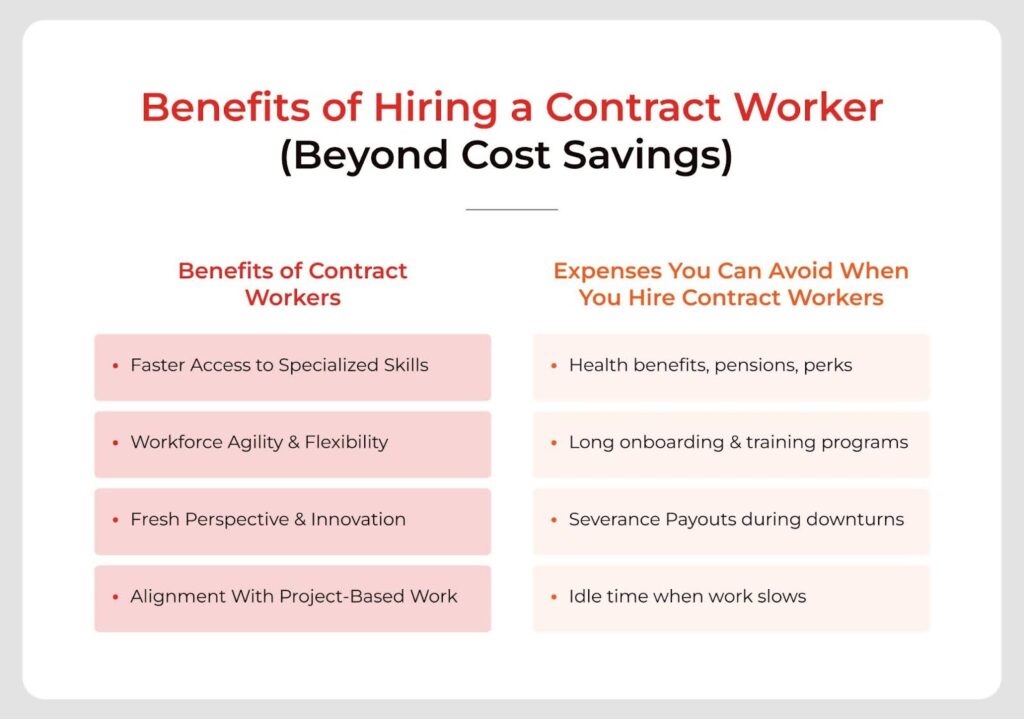For years, contract workers were considered a temporary fix until the “real hire” showed up. But that perception no longer holds true. Today, hiring a contract worker has gone beyond provisionally covering staffing gaps and has become a tool for building agility into the workforce strategy.
Across industries, whether a bank adopting new fintech platforms or a pharmaceutical company managing fluctuating R&D projects, contract talent is being banked upon to improve business outcomes.
Let’s talk about why organizations are rethinking this model, and the five most compelling benefits of integrating contract workers into your workforce mix.
Top Benefits of Hiring a Contractor vs Employee
1. Faster Access to Specialized Skills
A common frustration for talent acquisition leaders is how long it takes to fill a specialized role. A senior cloud architect or a compliance analyst with niche regulatory expertise might take 90+ days to recruit permanently. During that time, projects stall, clients wait, and competitors get ahead.
Contract workers compress that wait time. Established contractors often arrive with “plug-and-play” readiness, accustomed to short onboarding cycles and immediate deliverables. For example, a logistics company expanding into Southeast Asia may not need a full-time customs compliance manager on the company roster, but bringing in a contract worker with regional expertise for six months ensures smooth operations from day one.
In short: when speed to competency is critical, hiring a contract worker is often the fastest route to execution. It helps build the right team, right in time.
2. Workforce Agility Without Long-Term Commitment
Permanent headcount is sticky. Every full-time hire adds layers of fixed costs, including benefits, insurance, training, and severance liabilities. In contrast, contract workers give organizations breathing room. And this isn’t fringe anymore: 84% of companies now use contingent workers, with nearly half doing so to increase agility and flexibility as demand fluctuates.
Consider a biotech firm navigating unpredictable clinical trial outcomes. Some trials expand rapidly; others halt unexpectedly. Contract workers allow that firm to scale research teams up or down without being shackled by long-term commitments.
This flexibility offers more than cost control and helps manage risk. It keeps workforce planning aligned with business volatility instead of being derailed by it.

3. Cost Efficiency Beyond Payroll
The knee-jerk assumption is that contract workers are “expensive” because of higher hourly or project rates. But looking at headline costs alone is misleading. The real math comes from total cost of employment.
With contract talent, companies avoid expenses tied to:
- Health benefits, pensions, and other perks
- Long onboarding and training programs
- Severance payouts during downturns
- Idle time when project work slows
Imagine a global engineering firm, shifting 20% of its IT roles to contractors. They may cut overhead costs by as much as 15% annually, even though hourly rates are higher. The savings will come from reduced idle bench time and lower HR administrative burden.
That’s why many HR leaders now speak less about “cheap versus expensive” and more about cost-appropriate talent models.
4. Fresh Perspective and Innovation
Among the striking benefits of hiring a contract worker is the ability to import perspective. Contractors cycle through diverse industries and company cultures. They carry mental toolkits that permanent staff, steeped in one corporate way of working, may never acquire.
Take an independent contractor who’s implemented ERP systems across retail, healthcare, and manufacturing. When that person joins a consumer goods company, they bring comparative insights: what worked in one sector, what failed in another, and how those lessons might be adapted.
This external lens can shake teams out of entrenched thinking. In environments where “we’ve always done it this way” dominates, contractors often serve as catalysts for change.
5. Better Alignment With Project-Based Work
Modern business rarely operates in linear, predictable cycles. Instead, work is increasingly projectized: a six-month automation initiative, a one-year market entry, a nine-month product launch. Permanent hires don’t always fit that rhythm.
Contract workers do. Their availability and contracts naturally align with project timelines. And when the project is done, the engagement ends and there is no awkward redeployment or morale dip from underutilized employees.
For example, many fintech startups rely heavily on contract software developers during product build phases. Once the platform stabilizes, the ratio flips: a leaner permanent engineering team maintains and scales the product. This phasing is only possible with a contractor-heavy model in the early stages.
The Contract Worker vs. Employee Debate
Of course, no workforce strategy is one-size-fits-all. Hiring contractors vs employees is a decision that depends on role criticality, continuity needs, and organizational culture.
- Employees offer long-term loyalty, cultural integration, and institutional knowledge.
- Contractors bring agility, speed, and external expertise.
Savvy organizations design blended models where each has a place. For high-volume, repetitive roles, the direct-hire employment model works well. For specialized, project-driven, or volatile demand areas, contract workers carry the load.
The question is no longer why companies hire contractors instead of employees. The better question is: where in our business mix do contract workers provide the most value?
Also Read: When Should Companies Opt for Project-Based Staffing Services
Final Words
If we step back, the five benefits above all point to a larger truth: contract workers are now a form of strategic currency.
In financial capital management, you don’t invest in only one asset class. You diversify. Similarly, workforce capital today must be diversified, balancing full-time employees, contingent staff, and independent contractors. Each plays a distinct role in delivering growth while controlling risk.
As industries continue to digitize, globalize, and projectize, organizations that rely solely on traditional employment models will feel increasingly rigid. Those that integrate contract workers intelligently will move faster, spend smarter, and adapt better.
Ready to Rethink Your Workforce Strategy?
At SPECTRAFORCE, we help organizations move beyond traditional staffing by building flexible, compliant, and high-impact workforce models. Whether you’re hiring a contract worker to support a short-term project or designing a blended model of employees and independent contractors, our team brings the expertise, scale, and technology to make it seamless.
Let’s turn workforce agility into a competitive advantage. Talk to SPECTRAFORCE today.
FAQs
A contract worker is an individual engaged by a company on a temporary or project basis instead of a full-time employment contract. Contract workers are typically hired for their expertise and are paid for specific deliverables, timeframes, or milestones without the long-term obligations tied to permanent staff.
Companies hire contract workers instead of employees because they need workforce agility, cost efficiency, and access to specialized skills without long-term commitments. This model allows businesses to align talent with project cycles, reduce overhead, and scale teams up or down based on demand.
The main benefits of hiring a contract worker are faster access to niche expertise, the ability to scale flexibly, lower employment costs, fresh perspectives from diverse industry exposure, and natural alignment with project-based work. These benefits make contract workers a strategic tool for modern workforce planning.
It is better to have employees or independent contractors, depending on business needs. Employees are ideal for roles requiring continuity, cultural integration, and institutional knowledge. Independent contractors are better for short-term projects, specialized expertise, or when demand is uncertain. The best workforce models often blend both.
Examples of contract workers include IT developers hired for product launches, compliance consultants for regulatory transitions, marketing specialists for campaign sprints, and engineers brought in for large construction projects. These roles are usually project-driven and require expertise that isn’t always needed full-time.
The disadvantages of hiring contract workers are less cultural integration, potential confidentiality risks, and limited loyalty compared to employees. However, these risks can be mitigated with clear contracts, compliance checks, and proper onboarding practices.



